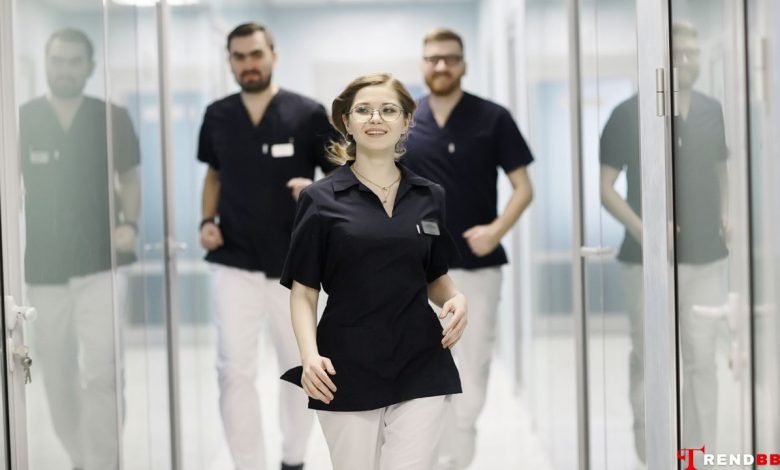
If you have a passion for healthcare, enjoy helping others, and seek a rewarding career in the medical field, becoming a medical assistant could be the perfect path for you. Medical assistants play a vital role in healthcare settings, providing essential support to doctors and nurses while ensuring smooth clinic operations. In this article, Trendbbq.com will share the how to Become a Medical Assistant, the required education and training, and the exciting opportunities that await aspiring professionals in this field.
Table of Contents,
1. What is a medical assistant?
Medical assistants play a vital role in the healthcare industry, contributing to the efficient functioning of medical facilities and providing essential support to physicians in patient care. Collaborating with doctors, nurses, and other healthcare professionals, their primary focus is on ensuring that patients receive the necessary care and attention they deserve.

2. What does a medical assistant do?
Medical assistants carry out a wide range of tasks as part of their daily responsibilities. These duties can vary depending on the specific work setting, and may include:
- Warmly welcoming patients as they arrive for appointments
- Assisting nurses with clinical tasks and procedures
- Handling various communication channels, such as answering phones, responding to emails, and managing online messages
- Managing billing and insurance-related matters
- Maintaining and organizing medical records
- Scheduling appointments and arranging procedures
- Gathering detailed medical histories and recording symptoms
- Ensuring cleanliness and restocking of examination rooms
- Measuring and recording vital signs, including pulse, temperature, and blood pressure
- Providing clear explanations about new medications to patients
- Conducting blood draws or establishing IV access when necessary
- Conducting basic diagnostic tests, like electrocardiograms (EKGs)
- Taking care of wounds and assisting with suture removal
- Assisting doctors and nurses during medical examinations
- Collecting and preparing laboratory specimens or conducting laboratory tests on patients
The specific tasks medical assistants perform can be influenced by state regulations and the preferences of the medical facility where they are employed. Some medical assistants primarily focus on administrative work, while others may have a greater emphasis on clinical duties.
3. Why Should You Become a Medical Assistant?
Whether you’ve always dreamed of a career in the medical field or you simply have a passion for helping others and think a healthcare career could be a good fit, we’re here to provide you with five compelling reasons why pursuing education and training to become a medical assistant in your community might be the right path for you:
Growing Demand for Medical Assistants
The healthcare industry is in constant need of skilled medical assistants, and this demand is expected to continue increasing, especially as the aging baby boomer population requires more preventive medical services. As the healthcare landscape evolves, the role of medical assistants becomes increasingly vital in supporting healthcare professionals in providing quality care to patients.
Ideal Starting Point for a Healthcare Career
Not everyone pursuing a career in the medical field has a traditional background or the resources to commit to lengthy education and training required for nursing or physician roles. Becoming a medical assistant offers an excellent entry point into the healthcare field. The training process is typically quicker and more accessible, providing a stepping stone to gain valuable career experience and potentially open doors to further opportunities within the healthcare industry.
Swift Training and Job-Readiness
Unlike doctors and nurses, who undergo extensive training that takes years to complete, aspiring medical assistants can be job-ready in a matter of months. Programs like the Medical Assistant Technician Program at FCC offer comprehensive education, hands-on training, and real-world experience within approximately 10 months. While formal education might not be mandatory in some states, employers generally prefer candidates with relevant training and experience, making programs like FCC’s a valuable asset for future medical assistants.
Versatility in Healthcare Settings
Medical assistants are needed in various healthcare environments, including hospitals, clinics, private practices, care facilities, research centers, and labs. Their skills and expertise are essential in providing support to healthcare teams across diverse specialties, such as pediatrics, geriatrics, OB-GYN, psychiatry, cardiology, and more. This versatility allows medical assistants to find fulfilling careers in a wide range of settings, regardless of location or patient demographics.
Impactful Patient Care
One of the most rewarding aspects of being a medical assistant is the ability to make a positive impact on patients’ lives. From scheduling appointments to offering emotional support and explaining treatment plans, medical assistants play a crucial role in patient advocacy. Their work allows them to interact with individuals of all ages, backgrounds, and circumstances, providing valuable insights into the human condition and fostering personal and professional growth.
In summary, becoming a medical assistant offers a promising and rewarding career path in the healthcare field. The growing demand, swift training, and diverse opportunities for impact make this profession an attractive option for those looking to contribute meaningfully to the well-being of patients and the broader community.

4. How to become a medical assistant
Embarking on a career as a medical assistant can be a fulfilling choice for individuals who want to make a difference in healthcare without undergoing extensive medical education. If you’re considering becoming a medical assistant, the following is how to become a medical assistant to kickstart your journey towards this rewarding profession.
Obtain a high school diploma or GED
If you aspire to become a medical assistant, the first step is to complete high school or obtain your GED. Generally, these qualifications are the minimum requirements for admission into most medical assistant programs.
Work on your workplace skills
In the medical field, the essence of a career is centered around assisting those in need. To be a competent medical assistant, certain essential skills are typically required to provide effective support to both patients and other healthcare professionals:
- Organized: A medical assistant must possess strong organizational skills to manage tasks efficiently, maintain records, and keep track of patient information.
- Detail-oriented: Paying close attention to details is crucial in healthcare to ensure accurate administration of medications, proper documentation, and precise follow-up on patient care.
- Ability to work on teams: Medical assistants often collaborate with various healthcare professionals, necessitating effective teamwork and communication to deliver seamless patient care.
- Empathetic: Having empathy is essential in providing compassionate care to patients, understanding their needs, and providing emotional support.
- Good at both verbal and written communication: Effective communication skills, whether speaking with patients or conveying medical information in writing, are vital for clear and accurate exchange of information.
- Able to work under pressure: Medical settings can be demanding and fast-paced. Being able to handle stress and maintain composure during critical situations is essential for a medical assistant.
Brush up on your computer skills
As a medical assistant, administrative tasks are often a significant part of your role. This involves maintaining records, handling bookkeeping, managing billing processes, and scheduling appointments, all of which are typically done using a computer. Many medical offices also utilize online portals to communicate with patients.
Given these responsibilities, having basic computer skills is crucial, including familiarity with Microsoft Office and other relevant software. Being proficient in these computer applications will enable you to efficiently carry out your administrative duties and ensure smooth communication and coordination within the healthcare setting.
Find accredited medical assistant programs
If you’ve made the decision to pursue a career as a medical assistant, the next step is to explore and apply to accredited medical assistant programs. These programs are available in various formats, including online and in-person, through vocational schools, community colleges, technical schools, and occasionally, colleges and universities. The duration of the program can span from one to two years, and it will encompass a wide range of subjects, from anatomy and physiology to first aid and other essential medical skills. By enrolling in an accredited medical assistant program, you’ll receive comprehensive training and knowledge necessary to excel in your future role as a medical assistant.
Complete an internship
In many medical assistant programs, an internship or externship is a common requirement that offers valuable hands-on experience in a clinical setting. Even if your program doesn’t mandate it, it’s highly beneficial to consider participating in one. By completing an internship, you can practice essential tasks such as taking vital signs and conducting minor diagnostic tests, allowing you to gain practical skills crucial for your future career. Additionally, internships can enhance your competitiveness as a job applicant, as employers often value real-world experience when hiring medical assistants. It’s an excellent opportunity to apply your classroom knowledge in a practical setting and build confidence in your abilities as a medical assistant.
Get certified
While certification may not always be mandatory, some states and employers may require it, and obtaining certification can potentially lead to a higher salary.
To become certified, you will need to meet the specific certification requirements, which often involve passing exams. Some common certifications include the Certified Medical Assistant (CMA) certification, provided by the American Association of Medical Assistants, and the Registered Medical Assistant (RMA) certification offered by the American Medical Technologists. In certain roles, CPR certification may also be necessary.
Numerous other certifications are available, so it’s advisable to check with your school to determine their recommendations or explore job descriptions in your local area to identify any preferred certifications by employers. Taking the time to become certified can enhance your qualifications and demonstrate your commitment to excellence as a medical assistant.
Network before you begin your job search
Before diving into extensive online job searching, consider the power of networking. Reach out to your instructors, professors, classmates, and individuals you know within the medical field. Networking can be an effective way to discover potential job opportunities. You might even find that the clinic where you completed your internship has a job opening that aligns with your career goals. Building and utilizing your professional connections can be instrumental in landing your desired medical assistant position.
Apply to big and small health care facilities
While large hospital networks may have a higher profile, don’t overlook the value of applying to smaller healthcare settings, such as local doctor’s offices. Working in a smaller operation can offer you the opportunity to handle a diverse range of tasks, which can be invaluable for gaining practical experience. Consider what type of work environment aligns best with your career goals, but also remain open to unexpected opportunities that may arise. Embracing different experiences can enrich your skill set and help you grow both personally and professionally.
Prepare for the interview
To prepare for interviews, it’s essential to practice your responses to common questions that you may encounter during a medical assistant interview. By anticipating these questions and formulating thoughtful answers, you’ll feel more confident and composed when facing the interviewer. Here are some potential questions you might come across:
- What relevant experience do you have in a medical setting?
- What motivated you to pursue a career as a medical assistant?
- How do you handle and manage stressful situations in a medical environment?
- How would you approach and deal with a challenging or difficult patient?
- What aspects of this particular office or clinic attracted you to apply for a position?
- Are you certified in first aid and CPR?
- What is your level of proficiency with medical software or computer systems used in healthcare settings?
Remember to tailor your responses to your unique experiences and qualifications, showcasing your skills and suitability for the medical assistant role. Practicing your answers in advance can significantly improve your interview performance and increase your chances of securing the position you desire.
Consider continuing your education
A considerable number of individuals opt to pursue work as medical assistants while simultaneously enrolling in training or degree programs for other medical professions, such as paramedics, nurses, or doctors. This allows them to gain practical experience and income while furthering their education in their chosen field.
Even if one’s goal is to continue as a medical assistant in the long term, there are opportunities to stay updated with the ever-evolving medical landscape by participating in relevant courses and continuing education within the medical assistant field. This commitment to continuous learning ensures that medical assistants can adapt to new advancements, technologies, and best practices, ultimately enhancing their skills and providing better care to patients.
5. What courses do you take to become a medical assistant?
Each medical assistant program may have its own specific course requirements, tailored to provide students with the necessary skills and knowledge for their profession:
- The program includes both theoretical courses and practical lab activities that focus on medical assistant duties. These may cover essential skills like taking vital signs, providing wound care, administering injections, and assisting with medical examinations and procedures.
- You will also encounter introductory-level courses and lab activities in subjects such as urinalysis, microbiology, phlebotomy, hematology, and pharmacology. These courses will emphasize how these fields relate to medical assistant practices, including taking specimens, drawing blood, and performing basic lab tests.
- In addition to the clinical aspects, there will be classroom coursework that covers administrative duties, procedural requirements, and electronic healthcare records. This is essential for medical assistants as they often handle tasks related to patient records and office management.
- Other important topics in the program include professionalism and cultural sensitivity, as these skills are crucial for effective communication and patient care.
- To ensure practical experience, you will have the opportunity to undergo training during an internship in an actual clinical setting. This hands-on experience will further enhance your skills and prepare you for the real-world challenges of being a medical assistant.

6. Frequently asked questions (FAQ)
What is a medical assistant, and what do they do?
A medical assistant is a healthcare professional who performs administrative and clinical tasks to support physicians and other healthcare providers. They may take vital signs, assist with procedures, handle patient records, and schedule appointments.
What education is required to become a medical assistant?
Most medical assistants have a post-secondary certificate or diploma. Programs typically take one to two years to complete. Some medical assistants may also have an associate’s degree.
Are there any specific skills or qualities needed to become a successful medical assistant?
Successful medical assistants possess excellent communication and organizational skills. They should also be detail-oriented, compassionate, and have a willingness to learn and work in a fast-paced environment.
Are there any certifications or licenses required to work as a medical assistant?
Certification is not mandatory in all states, but many employers prefer certified medical assistants. Common certifications include Certified Medical Assistant (CMA) or Registered Medical Assistant (RMA). To become certified, one must pass an exam after completing an accredited program.




Your article helped me a lot, is there any more related content? Thanks!